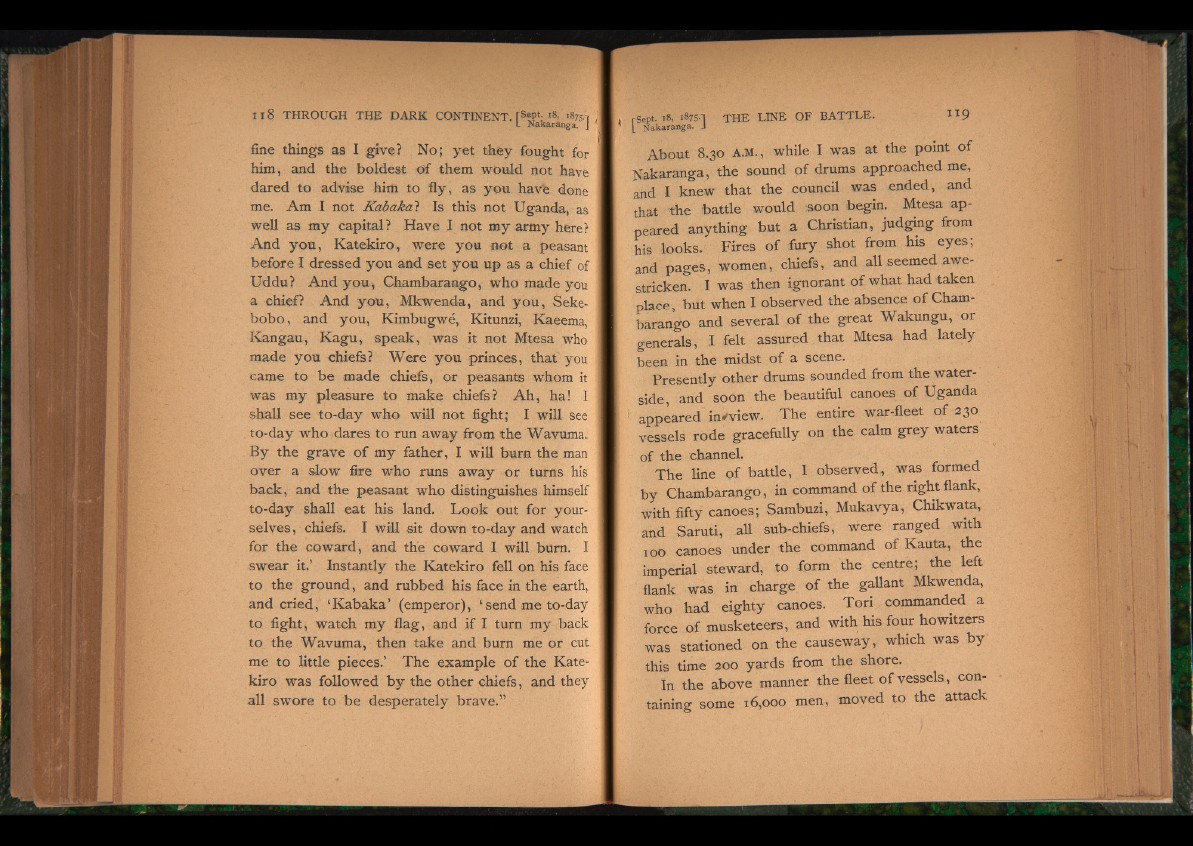
fine things as I give? No; y e t they fought for
him, and the boldest o f them would not have
dared to advise him to fly , as yo u have done
me. Am I not Kabakal Is this not Uganda, as
well as my capital? Have I not my army here?
An d y o u , Katekiro,, were yo u not a peasant
before I dressed yo u and set yo u up as a chief of
Uddu? And y o u , Chambarango, who made you
a chief? And y o u , Mkwenda, and y o u , Seke-
b obo , and you, Kimbugwe, Kitunzi, Kaeema,
Kangau , K a gu , speak, was it not Mtesa who
made yo u chiefs? Were yo u princes, that you
came to be made chiefs, or peasants whom it
was my pleasure to make chiefs? A h , ha! I
shall see to-day who will not fight; I will see
to-day who dares to run away from the Wavuma.
B y the grave o f my father, I will burn the man
over a s low fire who runs aw ay or turns his
back, and the peasant who distinguishes himself
to-day shall eat his land. L o o k out for yourselves
, chiefs. I will sit down to-day and watch
for the coward, and the coward I will burn. I
swear it.’ Instantly the Katekiro fell on his face
to the ground, and rubbed his face in the earth,
and cried, ‘K a b a k a ’ (emperor), ‘ send me to-day
to fight, watch my flag, and if I turn my back
to the Wavuma, then take and burn me or cut
me to little pieces.’ T he example o f the Katekiro
was followed b y the other chiefs, and they
all swore to be desperately brave.”
About 8.30 A.M., while I was at the point o f
Nakaranga, the sound o f drums approached me,
and I knew that the council was ended, and
that the battle would soon begin. Mtesa appeared
anything but a Christian, judging from
his looks. Fires o f fu ry shot from his eyes;
and pages, women, chiefs, a n d all seemed awe-
stricken. I was then ignorant o f what had taken
place, but when I observed the absence o f Chambarango
and several o f the great Wakungu, or
generals, I felt assured that Mtesa had lately
been in the midst o f a scene.
Presently other drums sounded from the waterside,
and soon the beautiful canoes of Uganda
I appeared in/view. T he entire war-fleet o f 230
vessels rode gracefully on the calm g rey waters
of the channel.
T h e line o f battle, I observed, was formed
b y Chambarango, i n command o f the right flank,
with fifty canoes; Sambuzi, Mukavya, Chikwata,
and Saruti, all sub-chiefs, were ranged with
100 canoes under the command o f Kauta, the
imperial steward, to form the centre; the left
flank was in charge o f the gallant Mkwenda,
who had eighty canoes. Tori commanded a
force o f musketeers, and with his four howitzers
was stationed on the causeway, which was b y
this time 200 yards from the shore.
In the above manner the fleet o f ve sse ls, containing
some 16,000 men, moved to the attack